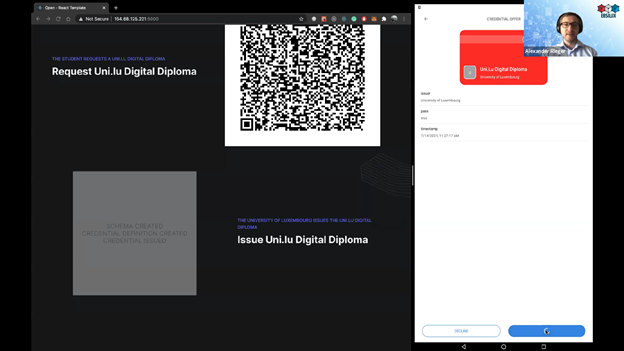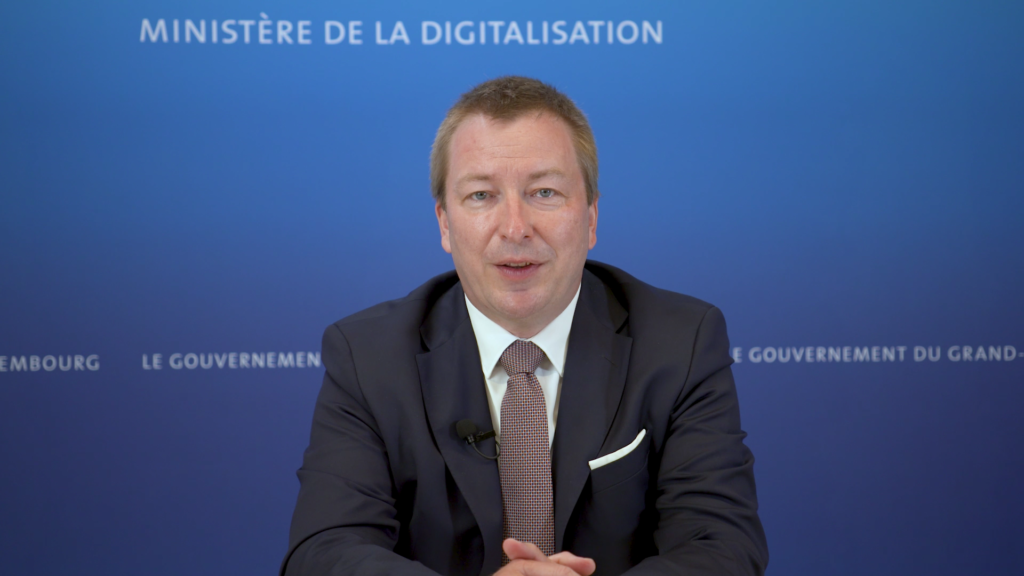On 14th July 2021, the EBSILUX project was officially presented to ministries, administrations and public institutions.
During the online presentation, participants had exclusive insights into the EBSILUX project co-financed by the European Union. The project aims to integrate Luxembourg into the European Blockchain Services Infrastructure (EBSI) and to implement a European EBSI Diplomas use case at national level.
Marc Hansen, Luxembourg Minister Delegate for Digitalisation opened the event by revealing what the EBSILUX project is about and how it “(…) will help to learn and familiarize citizens with the concept of verifiable credentials and digital wallets.” He explained that, “The project we stand for concerns the creation of a wallet for digital diplomas. These digital diplomas will allow an automatic verification of the authenticity of said diplomas and will therefore, help to reduce fraud and claims about educational achievements.” He concluded his speech by stressing, “This is a first important step to create the infrastructure for exchanging data from trusted sources between the public and the private sector.”
Following the opening speech, a detailed introduction presentation of EBSI was given by the Ministry for Digitalisation as one of the founding partners of the EBSILUX project. Patrick Weber, Attaché at the Ministry for Digitilisation explained that, “EBSI will enable Government bodies to digitalise and issue or certify documents that are the standard way to verify information about people (identity cards, work permits, driving licenses, etc.), legal entities and goods (origin of containers, safety of products, etc.)” After revealing the objectives and targets of the infrastructure, P. Weber gave a short explanation on the multi-country project and how EBSI will support cross-border and local applications. He also covered the current EBSI use-cases, notably the Diplomas use case and other upcoming use cases.
Thierry Grandjean, Research Engineer Blockchain at Luxembourg Institute of Science and Technology (LIST), shared his expertise on technical information on EBSI, as well as explaining that, “Luxembourg is currently hosting two EBSI V2 nodes. We are running one node which is managed by the Ministry for Digitalisation. It has been up and running since September 2020 and has been fully updated on V2 as the first activity of this project.”, before adding that a second node is managed by Infrachain and hosted by LIST.
For the second part of the event focusing on EBSILUX, Eric Weber, Project Manager at the Ministry for Digitalisation presented the partners and the EBSILUX project goals.
E. Weber mentioned that as part of the project an already operational EBSI node (v1) was upgraded to a production ready version (v2), in order to contribute to the overall robustness and security of the EBSI. He then explained that the most important step is the implementation of the use cases, “EBSILUX is a combination of two use cases. There is a part called ESSIF (European Self-Sovereign Identity) which brings us to launching a wallet where digital credentials can be stored.” He added that, “The second part is the Diplomas use case.” The idea is to complement “paper diplomas that are issued today with structured data that have been certified by an issuer, in this case the University of Luxembourg, to be authentic data and that can be used for digital transactions.”
E. Weber gave more information about the digital wallets and verifiable credentials. He started by mentioning how today’s credentials are easy to forge and be lost or damaged and how a digital solution can better serve the people when they do a transaction. He shared an example of how digitised documents such as an ID card on a mobile phone can be stored and used by a third party while the new digital solution will allow people to only share the information they want to or which is needed. “Digital wallets are like containers where people can store attestations including information allowing to verify the authenticity of the attestation,” he said.
Regarding the Self-Sovereign Identity, E. Weber shared some of its principles such as:
- Interoperability – Identifies should be as widely usable as possible
- Control – Users must control their identities
- Consent – Users must agree to the use of their identity
To conclude, he presented visual elements representing the process of credentials verification and the main actors of the process.

Alexander Rieger, Research Associate at SnT, continued the presentation with a session on the implementation of EBSI’s Diplomas use case. He explained how EBSILUX will solve the challenges of paper-based diplomas that are inconvenient, time consuming and costly for students, as well as inconvenient to issue for issuing institutions but also hard to verify by verifying parties such as recruiting companies. “The long-term goal is that EBSI’s Digital Diplomas will be usable within public institutions across all European member states,” he declared.
To better understand how digital wallets will be used for in the EBILSUX project, Rieger explained that verifiable educational credentials will be employed by the Diplomas use case, that students can manage their digital diplomas in an EBSI-compliant digital wallet and that issuing and verification of these diplomas requires an issuing and verification application.
He concluded by presenting the next steps of the project which includes the modelling of the application, the development and trialing of an EBSILUX Minimum Viable Product (MVP) and the share of best practices.
The EBSILUX event ended by a demonstration of the EBSILUX application that’s currently being developed. Egor Ermolaev, Doctoral Researcher at SnT showed an example of a request for a digital diploma where the person receives a QR code which can be scanned so that the digital wallet can establish a connection with the university’s system. The university’s system will then issue a digital diploma to the student. Lastly, he demonstrated the request of digital diploma for verification that can be used when looking for a job for instance. “What you have seen in this use case, is an improvement of a process. It’s a process that involves citizens and governmental entities but there’s no reasons why this shouldn’t be applicable to any industry use cases,” Ermolaev explained.

Contact us HERE if you are interested in empowering your alumni or if you are looking for a cost-effective and privacy-focused modern solution for your organization.

